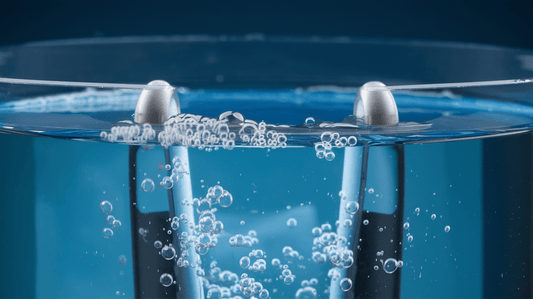Hydrogen Water: Low Concentration, Potent Antioxidant Effects
UpdatedOur Commitment to Accuracy and Objectivity
Ocemida is committed to delivering reliable and unbiased information. Our editorial team, comprised of experienced editors and medical experts, meticulously reviews every article and guide to ensure the content is accurate, up-to-date, and free from bias.
Rigorous Fact-Checking Process
To uphold the highest standards of accuracy, we adhere to the following fact-checking guidelines:
Trusted Sources: We only cite reputable sources, such as peer-reviewed journals, government reports, academic and medical associations, and interviews with credentialed healthcare professionals.
Evidence-Based: All claims and data are supported by at least one credible source. Each article includes a comprehensive bibliography with full citations and links to the original sources.
Internal Linking: While we may include internal links to other relevant Ocemida pages for better navigation, these links are never used as primary sources for scientific information.
Expert Review: A member of our medical or scientific expert team provides a final review of the content and cited sources for all articles and product reviews related to medical and health topics.
By following these rigorous standards, Ocemida strives to provide readers with reliable and informative content.
Share with a friend
Antioxidants play a crucial role in protecting our cells from damage caused by free radicals. Free radicals are highly reactive molecules that can cause oxidative stress and lead to chronic diseases such as heart disease, cancer, and aging. Antioxidants neutralize these free radicals and prevent them from causing harm.
Hydrogen water is a relatively new concept that has been gaining attention for its potential health benefits. It is essentially water that has been infused with extra hydrogen molecules, which are believed to act as powerful antioxidants.
One common objection to hydrogen water is its low concentration of hydrogen. Skeptics argue that the low concentration renders it ineffective as an antioxidant. However, it is important to delve deeper into the concept of concentration, explore the relativity of effectiveness, and understand the unique properties of hydrogen water.
What is Hydrogen Water
Hydrogen water is simply water that contains additional hydrogen gas. The concentration of hydrogen in the water is measured in parts per million (PPM) or parts per billion (PPB). While the concentration may seem low compared to other substances, it is essential to consider the relativity and effectiveness of this concentration.
The concept of concentration can often be misleading. Higher concentrations do not necessarily equate to greater effectiveness. The key factor to consider is how well the substance can be absorbed and utilized by the body.
Comparing Concentrations - It is important to note that the effectiveness of hydrogen water is not solely dependent on its concentration. Comparative studies have shown that even at low concentrations, hydrogen water can still exhibit significant antioxidant effects due to its unique properties.
Understanding Absorption of Antioxidants
In order for antioxidants to exert their effects, they must be absorbed into the bloodstream. This absorption primarily occurs through the digestive system.
Various factors can impact the absorption of antioxidants. These factors include inflammation in the intestinal lining, insufficient stomach acid, and the molecular size of the antioxidants.
1. Inflammation in the intestinal lining can hinder the absorption process, making it difficult for antioxidants to enter the bloodstream.
2. Insufficient stomach acid can impede the breakdown of antioxidants and subsequent absorption into the bloodstream.
3. The molecular size of antioxidants plays a crucial role in their absorption. Larger molecules may have difficulty passing through the intestinal lining, resulting in poor absorption.
The Superiority of Hydrogen in Absorption
Hydrogen molecules are incredibly small in size, allowing them to be absorbed rapidly and efficiently into the bloodstream. Their small size enables them to pass through the intestinal lining easily, ensuring effective absorption.

| Antioxidant | Weight | Oxygen Reduction Potential |
|---|---|---|
| Ascorbic acid | 176.12 g/mol | -0.56 V |
| Vitamin E | 430.71 g/mol | -0.43 V |
| Glutathione | 307.32 g/mol | -0.24 V |
| Beta-carotene | 536.88 g/mol | -0.17 V |
| Lycopene | 536.88 g/mol | -0.13 V |
| Astaxanthin | 596.84 g/mol | -0.08 V |
| Hydrogen | 2.02 g/mol |
Note that the weights listed are molecular weights, and the oxygen reduction potential is a measure of the antioxidant's ability to donate electrons to reduce oxygen. The values listed are approximate and may vary depending on the specific conditions of the experiment
Because of this efficient absorption, even at low concentrations, hydrogen can still exert significant antioxidant effects. The small size of hydrogen molecules also enables them to reach the cellular level, providing protection and benefits that other antioxidants might not be able to offer.
This ability to penetrate cells is a unique property of hydrogen and sets it apart from many other antioxidants. It allows hydrogen to provide direct protection at the cellular level, addressing oxidative stress where it occurs.
Limitations of Typical Antioxidants
Mineral-based antioxidants, such as magnesium, have their limitations. They have recommended daily dosages that should not be exceeded to avoid potential side effects. Additionally, certain medications may interact with mineral-based antioxidants, making them unsuitable for individuals on those medications.
Plant-based antioxidants, like vitamin C, also have their own set of challenges. Excessive consumption of plant-based antioxidants can lead to potential toxicity. Furthermore, some individuals may have allergic reactions to certain plant-based antioxidants.
Benefits of Hydrogen Water
Hydrogen water offers several advantages over other antioxidants:
Powerful Antioxidant Properties: Hydrogen water has been shown to effectively combat oxidative stress due to its potent antioxidant properties. These properties arise from its small molecular size and efficient absorption.
Safety and Tolerability: Hydrogen water is generally safe and well-tolerated. It lacks the limitations and potential side effects associated with other antioxidants, making it a highly appealing option for individuals seeking antioxidant benefits.
Accessibility and Convenience: Incorporating hydrogen water into one's lifestyle is relatively easy. It can be consumed as regular drinking water or through specialized devices that generate hydrogen-rich water. This accessibility and convenience make hydrogen water a practical choice for individuals looking to increase their antioxidant intake.
Conclusion
The objection regarding the low concentration of hydrogen in hydrogen water can be addressed through a comprehensive understanding of the factors influencing the effectiveness of antioxidants. While the concentration of hydrogen may be low compared to other substances, the unique properties of hydrogen water, such as rapid absorption and cellular level protection, make it a powerful antioxidant despite the low concentration.
By being informed about the advantages of hydrogen water over other antioxidants, individuals can make educated choices for their health and wellness. Hydrogen water offers potent antioxidant effects, safety, tolerability, and convenience, making it a promising option for those seeking antioxidant benefits.
Table of Contents









































